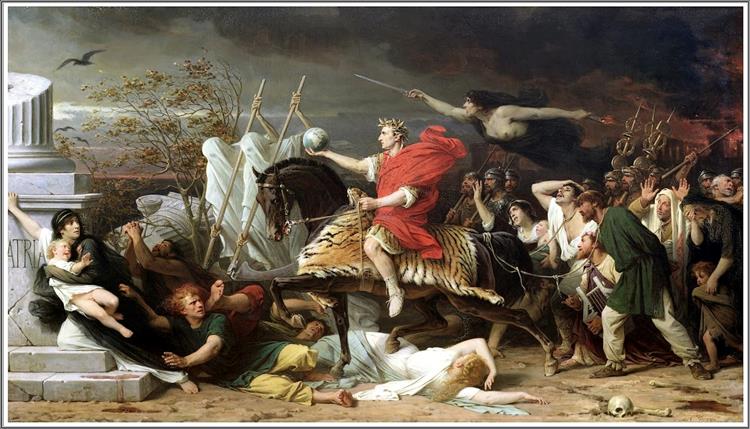The Name "Caesar"
In the Punic tongue the word caesar means "elephant." Caesaries also also means "thick head of hair." The surname Caesar was given to the Julian family of patricians¹ at Rome, apparently because one family member once owned an elephant or had a healthy scalp.After Julius had become the Dictator of Rome, his surname became an honorary title for the next 11 emperors during the age of the Roman Emperors, each emperor being hailed as a new "Caesar." So we often hear about the "12 Caesars," which includes Julius.
Early Life and Rise to Power
Julius was an innovative and tough political and military genius who single-handedly broke down the old Roman republic. His early rise was significantly aided by the formation of the First Triumvirate, an informal but powerful political alliance he forged with Pompey the Great and Marcus Licinius Crassus. This alliance allowed them to circumvent traditional senatorial opposition and advance their mutual interests.
When sailing to finish his education at Rhodes, he was held captive by pirates. Paying more than demanded for his release he quickly returned with a ship of his own and crucified the pirates he had recently paid.
Military Acumen and Vast Conquests
The Roman writer Pliny says that he conquered 800 cities, 300 nations and three-million people, which at that time in history was a considerable percentage of the Earth's population. His military campaigns, particularly the Gallic Wars, showcased his brilliant tactical mind and engineering prowess, like the rapid construction of a bridge over the Rhine.
Caesar traveled to current day England, where he wrote on the practices of the Druids. A learned scholar and historian, he used his influence to reshape the calendar into one with 365 days and leap years, making the year 365.25 days long. This Julian calendar was largely replaced by the Gregorian calendar, but it's still used in some countries today.
 |
| Image via Vatican Museums |
Political Vision and Crossing the Rubicon
Politically he favored the populares (elites who sought political influence and enacted reforms by appealing directly to the Roman people, often through the Tribunate and popular assemblies, sometimes in defiance of senatorial authority) over the optimates (nobles who aimed to uphold the traditional authority of the Senate and maintain the power of the aristocratic elite, preferring to work within established senatorial channels and resisting popular reforms they saw as destabilizing).²
 |
| César Franchit le Rubicon (Caesar Crossing the Rubicon) Adolphe Yvon, 1875 |
A pivotal moment in his career came when he "crossed the Rubicon" in 49 BCE, leading his army into Italy in defiance of the Senate's orders. This irreversible act marked the beginning of a civil war against Pompey and the Republican faction, a conflict he ultimately won. His subsequent actions, including his relationship and alliance with Cleopatra VII of Egypt, which produced their son Caesarion, further demonstrated his willingness to challenge Roman norms for political advantage.
The Ides of March: Conspiracy and Death
His end came about on the Ides of March (15 March, 44 BCE), the result of a conspiracy hatched by his closest advisers, all of whom stabbed him to death. The killers were lead by Brutus and Cassius. The conspirators, genuinely fearing his ambition and dictatorial tendencies, believed he was dismantling the very foundations of the Republic. Apparently Caesar resisted the attackers after the first stab wound, but upon seeing his friend Brutus among the group, accepted his grisly fate.
The night before his death Caesar's wife had vivid and terrible dreams, which perhaps Caesar should have taken into consideration. He was also warned of the plot by Artemidorus in a letter sent to the senate house, which he failed to read.
 |
| Vincenzo Camuccini (1771–1844) - The Death of Julius Caesar |
Legacy and Lasting Impact
By the time of his death Caesar had stopped listening to the nobles altogether, a move which they clearly didn't like. He had virtually ended the old Republic and his overweening confidence, which had taken him so far, ultimately led to his downfall. Ironically, his assassination, intended to restore the Republic, instead plunged Rome into further civil wars, ultimately paving the way for the establishment of the Roman Empire under his adopted heir, Octavian (later Augustus).
His life has been depicted in several films and William Shakespeare wrote the tragic play, Julius Caesar, which looks at the conspiracy leading to his death, especially from the perspective of Brutus. Shakespeare's Brutus, in fact, gets about four times as many lines as Caesar. His name, "Caesar," became synonymous with absolute power and leadership, influencing titles like "Kaiser" in Germany and "Tsar" in Russia for centuries to come.
—
¹ The patricians were a privileged class of Romans who, among other things, dominated politics and the priesthood.
² While alluded to in ancient literature, the difference between these two groups is just as complicated as the shifting scene between our contemporary "Liberals" and "Conservatives" (or in the USA, "Democrats" vs. "Republicans").

Comments